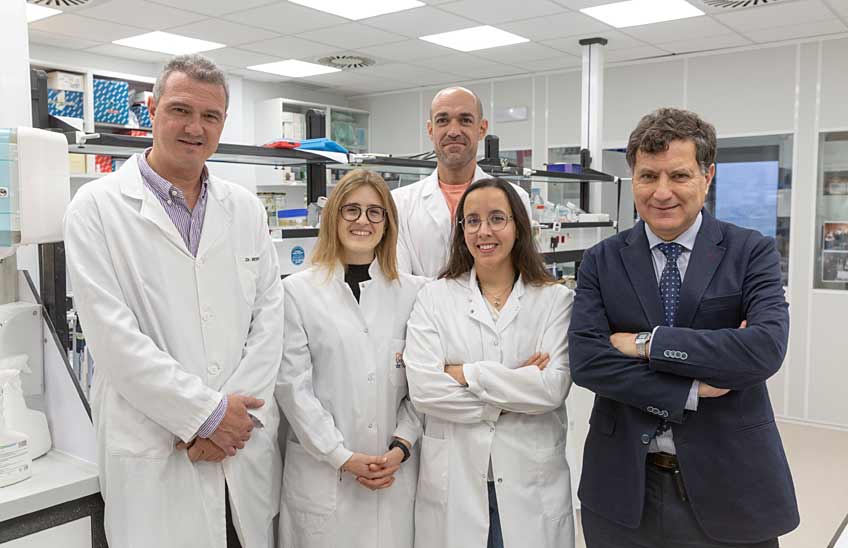New virotherapy strategy paves the way to treat abdominal cavity metastases
Researchers at Cima University of Navarra develop a more effective and safer preclinical treatment to combat advanced ovarian, colon and stomach tumors.

FotoManuel Castells<br>/Pedro Berraondo, Leire Arrizabalaga, Fernando Aranda, Ángela Bella e Ignacio Melero, investigadores del Cima Universidad de Navarra
11 | 12 | 2023
A research of the Cima University of Navarra, at partnership with business pharmaceutical Bavarian Nordic, has presented a preclinical treatment -more effective and with fewer side effects- that uses virotherapy to combat advanced stages of ovarian, colon and stomach cancers.
Peritoneal metastasis is the result of the spread of tumors developed within the abdominal cavity. It is diagnosed as an advanced stage of cancer with a very poor prognosis and particularly affects 7 out of 10 cases of ovarian cancer. Moreover, current treatments to reverse its spread are limited.
The work, recently published in the Journal for ImmunoTherapy of Cancer, develops a treatment using virotherapy that acts on a tissue in the abdominal cavity, the omentum, which has vital immune functions and protects the abdominal cavity from infection. However, in cases of cancer it becomes, paradoxically, the origin of tumor extension.
The research has revealed that intraperitoneal administration of the modified viral vector Vaccin Ankara Vaccine (MVA) promotes the expression of antitumor genes in the omentum, transforming it from an 'enemy' to an 'ally' in the fight against metastasis.
"Our study demonstrates that, through the loco-regional treatment of an AVM expressing the cytokine interleukin 12, it is possible to immunomodulate the metastatic omentum and reverse its development", explains Dr. Fernando Aranda, researcher of the Immunology and Immunotherapy Program of Cima and director of work, which is integrated in the Cancer Center Clínica Universidad de Navarra.
"We are excited about the potential positive impact this advance has on its clinical translation and could become an alternative in the treatment of patients with peritoneal metastases," notes Angela Bella, first author of work and predoctoral researcher.
Innovation for the benefit of the patient
This research represents a step forward in the treatment of a disease with few therapeutic alternatives to date. Researchers at work stress the importance of the partnership between the academic research and the pharmaceutical industry to conduct clinical trials and translate innovative discoveries into tangible benefits for patients.
"Much remains to be elucidated in how the omentum responds to immunotherapies that are administered loco-regionally, but this work opens the way to new strategies to combat advanced intraperitoneal cancer," says Dr. Aranda.
The work is part of CIBERONC and has received funding from the BBVA Foundation, the association Española Contra el Cáncer, the Instituto de Salud Carlos III, the Government of Navarra (within the strategic project ARNMUNE) and the European program Horizon 2020, among other institutions.
reference letter bibliographic
-
Journal for Immunotherapy of Cancer. 2023 Nov;11(11):e006702. Intraperitoneal administration of a modified vaccinia virus Ankara confers single-chain interleukin-12 expression to the omentum and achieves immune-mediated efficacy against peritoneal carcinomatosis.
